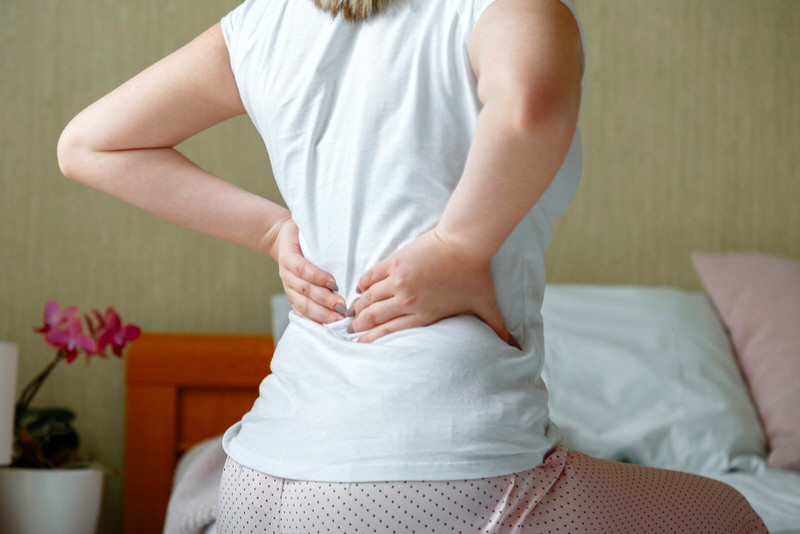Premenstrual symptoms can almost be the same as the early signs of pregnancy. Progesterone is mostly responsible for similarities in symptoms, so whether you are actively trying to get pregnant or not, you might feel some symptoms like the tenderness of the breast, changes in appetite, mood swings, cramps, muscles aches which could cause your upper back pain.
Your ovulation will trigger your progesterone to increase; it prepares your body for pregnancy even if you are not pregnant because it will take a few days for implantation to happen.
If you’re not pregnant, the symptoms of progesterone are likely to disappear around 10 days after ovulation, but if you are, then taking a pregnancy test should give you a BFP!
Early symptoms of pregnancy
Once you ovulate, you will enter the luteal phase, which is the time between ovulation and menstruation or, in this case, once a fertilized egg implants in the uterine lining. This time is also when different hormone levels are changing to prepare for the possibility of a fertilized egg.
Progesterone levels increase after ovulation and peak about 6-8 days later and are responsible for changes that you may feel in your body as early symptoms of pregnancy.
Exhaustion
One of the most common side effects of the increased level of progesterone is unexplained exhaustion or fatigue.
This usually happens between 6 to 10 DPO (days past ovulation) and could go on for the first trimester due to the changes in your body in preparation for the growing baby in your belly.
Cramps
We, women, are no strangers to cramps. Some of us experience this every month with our period. Some are even lucky enough to just have mild period cramps, but this too is a common early symptom of pregnancy caused by implantation, which is when the egg burrows itself into your uterus.
Backache
Your body is already preparing to make room for the fetus. With implantation cramps, your uterus is preparing to grow many times in size. This can cause a mild backache, which is another symptom commonly associated with your period.
These symptoms, just like the others, are very mild at the start. Some will not even notice the changes happening inside them in the early stages of pregnancy.
Headache and nausea
Headaches and nausea are other symptoms that could be easily overlooked or confused with PMS (premenstrual syndrome) due to hormonal surges is a headache. But if it comes with nausea or morning sickness, it is mostly because you are pregnant.
It might last throughout your first trimester, but it will still vary for every pregnancy is different.
Tender breasts
Your hormones working extra are still to blame for breast tenderness and swelling at this point. You might also notice darker and larger areolas.
Bloating and gas
Pregnancy hormones can slow down digestion and cause increased gas as early as 9 DPO, and since your digestion may be slower, it takes longer for food to pass through the stomach and bowels, which can cause bloating.
Ways to ease backaches during early pregnancy

1. Exercise
Talk to your doctor or your healthcare provider before doing any program that would encourage free movement between the joints in your upper and lower back.
Making this a habit during your early pregnancy will make it more comfortable for your back when you reach the 2nd and 3rd trimester when the baby is taking much more space in your body.
2. Maternity bras
An increase in breast size is a common change you see in your body during pregnancy. It adds weight at the front of your chest, which can round your shoulders and increase the curves in your upper back and neck.
Try using a more comfortable size that would fit perfectly. It doesn’t need to be exclusively tagged as a “maternity bra,” as long as it fits you perfectly and feels more comfortable.
3. Good posture
This might sound simple, but it gets harder and harder in our generation since we are always looking down at our phones, computers, or other activities. Stand up straight and tall, hold your chest high, keep your shoulders back and relaxed, don’t lock your knees.
It will help you a lot in the coming months of your pregnancy, and your back will thank you for it.
4. Sleeping position
I find this a big factor for neck and back pains. We usually sleep however we want, but since our body is going through so many changes during pregnancy.
It gives a different type of ease and comfort if you sleep in a proper position that would be good for your posture, and you wake up feeling rested and not tired.
5. Hot and cold compress
Ask for your doctor’s approval before doing so. If your health care provider approves, start by putting cold compresses on the painful area on your back for up to 20 minutes several times a day.
After two or three days, switch to heat — put a heating pad or hot water bottle on the painful area. Please don’t put the hot or cold compress to your abdomen unless you are instructed by your doctor.
FAQs
When should I take a pregnancy test?
You should wait to take a pregnancy test until the week after your missed period for the most accurate result. If you don’t want to wait until you’ve missed your period, you should wait for at least one to two weeks after you had sex.
If you are pregnant, your body needs time to develop detectable levels of HCG (Human chorionic gonadotropin), the hormone normally produced by the placenta.
How accurate are pregnancy test kits?
A pregnancy test kit is rarely wrong; it is more than 99% accurate.
So, if your test is negative, it means that you are not pregnant, but if you are very early in your pregnancy and the test is done far too early, there could be an insufficient amount of urine hCG for the test to detect.
Conclusion
Pregnancy is probably one of the most magical yet difficult stages of a woman’s life. There will be multiple changes that will take place in your mind and body to accommodate the growth of your baby and how the two of you would share your body for 9 months!
You will need to sacrifice some things for yourself to prioritize your baby’s needs, and you have to endure the rollercoaster of changes to make sure that they will be healthy and safe; it’s going to be so worth it.



